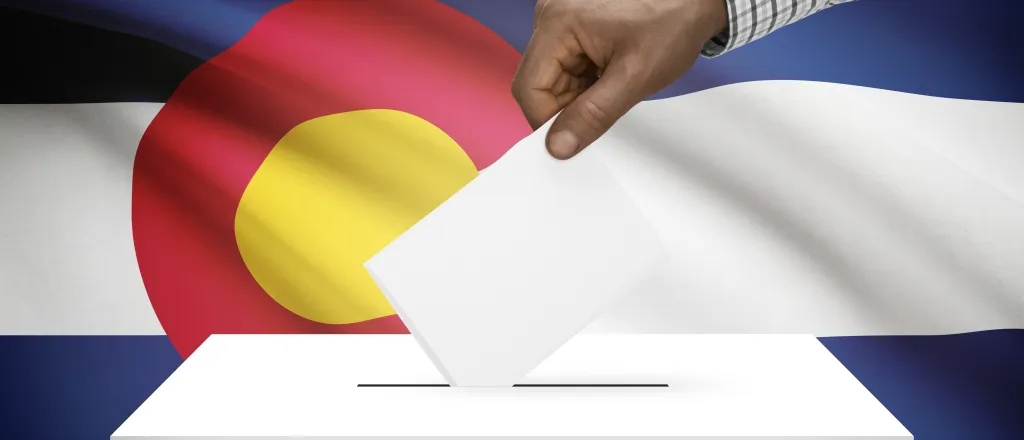
Here's how Colorado's tax-related measures fared at the ballot box
(The Center Square) – Colorado voters decided on five tax or fee-related measures in Tuesday’s election, among them a measure to lower the state income tax rate and another to repeal the state's Gallagher Amendment.
Voters approved Proposition 116, which reduced the state income tax from 4.63% to 4.55%, with 57% of the vote, even though opponents of the measure outraised supporters by nearly $500,000, according to Ballotpedia.
The state income tax reduction will save taxpayers an estimated $203 million next year and $154 million in 2022. The average taxpayer will pay $37 less in income tax each year.
Amendment B, which repealed the Gallagher Amendment, passed by a 400,000-vote margin with 1.6 million votes cast in support of the measure.
The Gallagher Amendment limited residential property taxes to 45% of the state’s total sum. In preparation for its repeal, the General Assembly passed SB20-223 during the 2020 legislative session, which capped residential property taxes at 7.15% and commercial property at 29%, the same rates that Gallagher requires. Without the bill, residential rates would have dropped to 5.88% next year.
Groups like the Colorado Association of School Boards supported repealing the amendment because it could lower nonresidential property assessment rates and potentially increase funding for Colorado’s schools.
“Repealing the Gallagher Amendment will prevent a loss in desperately needed funding to help support schools as they weather the economic toll of the global pandemic by mitigating the effects of the cuts and allowing schools to maintain essential services to students, families, and the community,” CASB said in its sample resolution supporting the repeal.
Proposition 118, the statewide paid family leave program, and Proposition EE, new taxes on nicotine and e-cigarette products, passed with ease, the latter bringing in over 67.5% of the vote.
With the passage of Prop. EE, tax increases on nicotine products and e-cigarettes will grow to $2.64 by 2027. The state estimates it will generate $87 million in state budget year 2020-21 and $176 million in state budget year 2021-22 to support preschool programs, the rural school cash fund, and the state educational fund.
Colorado ranks near the bottom of states in per pupil funding, according to Governing.com. During the 2020 legislative session, lawmakers had to cut $1.3 billion from its education purse to pass a statutorily required balanced budget.
However, analysts at the Colorado Fiscal Institute described the proposition as paradoxical because it is a “corrective tax,” one that is designed to dissuade people from acting in certain ways. If it is successful, revenues from the tax will decrease over time.
“We all know that tobacco and vaping result in poor health outcomes. Use of these kinds of products also drives up the cost of health care for everybody, but particularly the people who use them,” the group said in a statement.
However, the paid family leave program, known as Proposition 118, could take more money out of school than both of these measures add, according to an analysis by the Common Sense Institute (CSI), a free enterprise research organization.
CSI found the measure would increase state expenses by up to $94 million to provide its employees the required 12 weeks of paid sick time per year. The program is funded through premiums that employers and employees split 50/50.
Premiums during the first two years of the program are set at 0.9% of an employee’s salary. By 2025, premiums will increase to 1.2%. The program’s first year of operation is expected to generate $575.4 million and $1.2 billion the following year, effectively increasing corporate tax rates by 204%, according to CSI.
“While the direct costs of the program are ultimately born directly by both employees and employers, there may be further indirect impacts. Depending on the industry and firm dynamics many direct costs to employers are often passed on in the form of higher prices to consumers or lower wages to workers,” the organization’s analysis of the measure reads.
Proposition 117, while not officially called yet, has 52.58% approval and a 150,000 vote lead, according to unofficial election results. The measure requires that any newly created state enterprise estimated to collect over $100 million in fees in the first five years be approved by voters.
State enterprises aren’t subject to the revenue cap under the Taxpayer’s Bill of Rights (TABOR). Taxpayer advocacy groups have long made the case that lawmakers have used fees to skirt TABOR, which requires voter approval for tax increases.
The measure “may reduce the total amount of revenue collected in service charges paid to government-owned businesses,” according to a fiscal report, by making it harder to create a new enterprise.

















